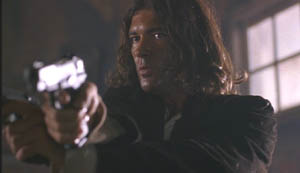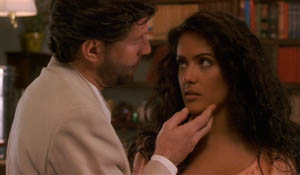|
Desperado was fledgling director Robert Rodriguez' big-budget follow-up to his critically praised super-cheap indie pic El Mariachi. When I say "big budget," I don't mean extraordinarily big, just more than the paltry seven thousand bucks of the first film.  Picking up an indeterminate period of time after Mariachi, Desperado continues the story of the musician-turned-avenger who has spent the period of his life between this and the previous film tracking down and knocking off drug lords in an out-of-control revenge fest spurred by the murder of his girlfriend. Since her actual killer died at the end of Mariachi, the link to the events in that film seems a bit tenuous; either Rodriguez couldn't come up with a more concise reason for the Mariachi's vengeance quest, or he deliberately intended the character to be somewhat unbalanced and irrational, ruthlessly pursuing and punishing anyone even remotely connected to the killer in a desperate attempt at closing his own wounds. There's some hints in the narrative that indicate that the second of these is the intended point, and Antonio Banderas (taking over the role of the Mariachi from Carlos Gallardo) is damn near perfect in the role of the emotionally and physically scarred hero, the latest reinvention of the Man With No Name. His success in the role has less to do with what he says than with his glaring intensity and near-whispered delivery, and the graceful, almost balletic physicality he brings to the classical gunfighter role. There's little denying, however, that the real star here is writer-producer-director-editor Robert Rodriguez. The average action movie doesn't tend to have a terribly good script, a pattern which Desperado happily bursts asunder. The screenplay infuses its main character with enough humanity and reflection that it's easy enough to buy into believing in him as a real human being, even amidst the comic-bookily overamped action and violence. It also possesses enough humor and levity that the violence doesn't become ponderous. The film gives a hearty "Hello, audience! I'm here for your amusement!" to the viewer that makes it a welcome change from standard cookie-cutter shoot-em-ups. It's Rodriguez' editing flair that stands out the most here. His habitual approach of rapidly cutting between several different angles makes the action seem ultra-fast and fluid, removing the middles from most actions and simply leaving us with the start and finish, making the Mariachi seem, for example, to be the most adroit human being alive when it comes to reloading a pistol. His approach to slower, dreamier sequences follows a pretty similar technique, simply adding dissolves to gracefully speed up the action without it actually feeling sped-up. The film as a result feels incredibly precise, but not dry and mechanical. Rodriguez has a knack for exuberance and excess born from a self-taught style that began with him simply running around with a home video camcorder, a hobby that served him well. Indie films all too often end up being somewhat pretentious exercises in "real life drama," when people are mostly wanting to get as far away as possible from their own real-life dramas. Here we get a style-laden genre pic about a vengeance-mad guitar player with a case full of guns and grenades, instead of drab collegiate introspections on the unbearable angst of life. For this, I have to say thanks, as I'd really prefer the unbearable angst of being shot at with a machine gun. You know, I mean, as far as the movie goes. I'd prefer my real life be as free of machine guns as possible.  All said, Desperado isn't at the pinnacle of filmmaking achievement, even for an exercise in excess-for that, see Evil Dead II, a film with absolutely no illusions about deeper meaning. The ending is handled somewhat abruptly, there are two old friends of the Mariachi who show up late in the game just long enough to participate in a big fight and then die (this was handled a good deal better in the subsequent Once Upon a Time in Mexico, although the overall film wasn't as good as this one,) and let's face it, the love scene between Banderas and Salma Hayek comes rather out of the blue and is frankly exceedingly indulgent and a tad exploitative (Hayek was reportedly none too pleased with the whole affair). However, for a decidedly non-intellectual film, it's great fun and a gleefully self-amused take on the classic wandering hero concept that manages drama without holding itself up too high. Plus, I have to respect the integrity of Robert Rodriguez for refusing to Americanize his hero, declining, in spite of studio concerns, to crush out his Latin roots. The Mexican flavor and setting contribute more to the overall flavor than can be ignored, reviving the feel of the classic western without actually having to set the story in the past. While extremely tight, it isn't Hollywood-slick, nor should it be. It's a film with an actual personality, and in a day of endlessly similar product, any vestige of personality is a thing to be preserved, corporate fretting be damned.
-review by Matt Murray
|
|
||||||||